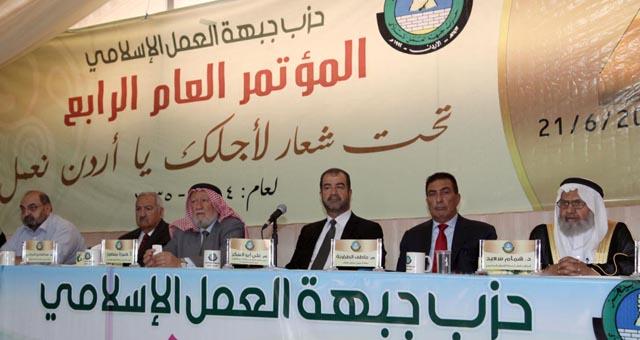You are here
Muslim Brotherhood presents united front in general assembly
By Taylor Luck - Jun 21,2014 - Last updated at Jun 21,2014

AMMAN — The Muslim Brotherhood presented a united front at its political arm’s general assembly on Saturday amid calls for reform within the movement.
In the fourth general conference of the Islamic Action Front (IAF), the movement’s liberal and conservative factions temporarily put aside ideological divisions to call for greater reform both within the party and throughout the country.
Veteran IAF members set forward the Islamist movement’s internal and external policies for the next four years, issuing a mission statement outlining the party’s positions on the Palestinian issue, internal reforms and the country’s democratic reform process.
Islamists called for greater “separation of powers” within the IAF, and unanimously agreed to increase its membership base in the capital and the outlying governorates as well as increase the role of women and young people in the movement.
Marking a new addition to the IAF’s mission statement is “combating extremism”, with party members calling for greater efforts to “combat violence, terrorism and extremism”, to arrive at “non-violent” solutions to the problems facing the Muslim world and promoting “dialogue among all segments”.
At the closing of the one-day assembly, party leaders ratified the results of recent elections for the IAF shura council, in which conservatives grabbed 60 out of the 80 seats.
The conference marked a rare show of unity for the Brotherhood, which has been plagued by a deepening crisis over the expulsion of three prominent liberal leaders and calls from various factions for an “overhaul” of its conservative-dominated leadership.
Leading figures of the movement’s rival liberal and conservative wings went to great lengths to show a united front on Saturday, with conservative overall leader Hammam Saeed embracing IAF Secretary General Hamzah Mansour and talking at length with Ishaq Farhan — key members of the liberal wing.
Members refused to even broach the subject of the so-called “Zamzam crisis” and the future status of Rheil Gharaibeh, Jamil Dheisat and Nabil Kofahi, whose memberships were terminated by an internal court decision in late March for their participation in the establishment of the National Building Initiative (Zamzam).
Instead, Brotherhood leaders focused outwards, with Saeed and other senior figures calling for greater political and democratic reform in Jordan.
“We are all gathered for a central cause, and that is regime reform and true democratic and political change,” Saeed said at the opening of the general assembly, attended by several prominent non-Islamist figures, including Lower House Speaker Atef Tarawneh and former speaker MP Abdul Hadi Majali, head of the nationalist National Current Party.
The conference was previously in doubt after the government and the Greater Amman Municipality declined a request by the Brotherhood to use Al Hussein Cultural Centre or several other state-owned facilities for its assembly.
Islamist leaders accused the government of “blacklisting” the party from several hotels and convention centres, claiming that pressure from authorities forced the country’s largest opposition movement to hold its general assembly in a tent erected on a vacant lot in north Amman.
Related Articles
The Jordan Muslim Brotherhood is set for an internal administrative overhaul after the movement’s leadership agreed on its largest reform initiative in nearly 20 years.
The Muslim Brotherhood is one step closer to an internal reform overhaul this week as leaders debated the widest changes to the Islamist movement’s internal policies in nearly five decades, according to members.
The Muslim Brotherhood leadership plans to take disciplinary measures against former overall leader Abdul Majid Thneibat for allegedly “inciting insurrection” within the movement, Brotherhood officials said Saturday.














